Art
-
The New Digital Storytelling Series: Caspar Sonnen
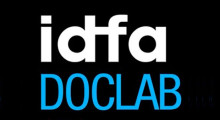
For the final installment of Filmmaker and the MIT Open Documentary Lab’s interview project with the foremost thinkers on transmedia, IDFA DocLab’s Caspar Sonnen answers our questions. Sonnen is the new media coordinator for the International Documentary Film Festival Amsterdam (IDFA) and curator of the festival’s IDFA DocLab, a competition program for new forms of documentary and interactive storytelling. In 2008, Sonnen founded IDFA DocLab to create a platform for interactive and multimedia documentary storytelling that expands the genre beyond traditional cinema. Besides his work at IDFA, he is co-founder and programmer of the Open Air Film Festival Amsterdam. For an […]
by MIT Open Documentary Lab on May 24, 2013 -
The New Digital Storytelling Series: D. Fox Harrell
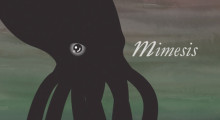
In the penultimate part of Filmmaker and the MIT Open Documentary Lab’s interview project with prominent transmedia figures, D. Fox Harrell, Ph.D., Associate Professor of Digital Media in the Comparative Media Studies Program and the Computer Science and Artificial Intelligence Laboratory at MIT, answers our questions. Harrell’s research explores the relationship between imaginative cognition and computation. He develops new forms of social media, gaming, computational narrative, and related computational media systems based in computer science, cognitive science, and digital media arts. The National Science Foundation has recognized Harrell with an NSF CAREER Award for his project “Computing for Advanced Identity Representation.” He has worked […]
by MIT Open Documentary Lab on May 16, 2013 -
The New Digital Storytelling Series: Ingrid Kopp

In the seventh part of Filmmaker‘s interview project with prominent figures from the world of transmedia, conducted through the MIT Open Documentary Lab, Ingrid Kopp, Director of Digital Initiatives at Tribeca Film Institute, answers our questions. Kopp oversees the TFI New Media Fund, runs Tribeca Hacks and produces TFI Interactive during the Tribeca Film Festival. For an introduction to this entire series, and links to all the installments so far, check out “Should Filmmakers Learn to Code,” by MIT Open Documentary Lab’s Sarah Wolozin. MIT Open Documentary Lab: How do you see people making the transition to digital interactive storytelling? Kopp: I think people have […]
by MIT Open Documentary Lab on Apr 18, 2013 -
The New Digital Storytelling Series: Brett Gaylor
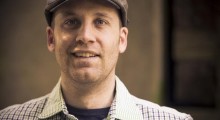
In the sixth part of Filmmaker‘s interview project with prominent figures from the world of transmedia, conducted through the MIT Open Documentary Lab, Brett Gaylor, Senior Director of Mozilla’s Webmaker initiative (including Mozilla PopcornMaker and Popcorn.js) answers our questions. Gaylor has previously been a member of the EyeSteelFilm documentary production company, the founder of Open Source Cinema and the web producer of Homeless Nation. For an introduction to this entire series, and links to all the installments so far, check out “Should Filmmakers Learn to Code,” by MIT Open Documentary Lab’s Sarah Wolozin. MIT Open Documentary Lab: How did you become a digital […]
by MIT Open Documentary Lab on Apr 11, 2013 -
The New Digital Storytelling Series: Mark Harris
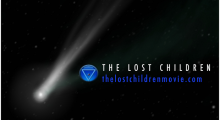
Mark Harris is a filmmaker and software architect. Mark writes software for gameplay, storytelling, and transmedia. Mark was a mentor at the first StoryCode StoryHack, and creative technologist on Lance Weiler’s Pandemic 1.0. Mark is also an alumnus of the IFP Narrative Lab. Mark’s transmedia project, The Lost Children, had its New York City premiere in Jan 2013 at Film Society of Lincoln Center, with a feature film and live immersive experience. In the Fall of 2012, Mark wrote his first immersive play for Epic Theater Ensemble, and in Spring 2013, Mark joins the hybrid studio/technology company Murmur. MIT Open Documentary Lab: How did you […]
by Scott Macaulay on Apr 4, 2013 -
The New Digital Storytelling Series: Kamal Sinclair
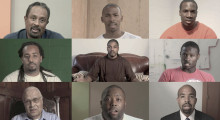
The Senior Manager at the Sundance Institute’s New Frontier Story Lab, Kamal Sinclair came to interactive via an unlikely, but, in many ways, appropriate route. While many in the interactive and new media fields hail from technology and filmmaking, Sinclair began her career in a medium where she received direct feedback from audience members every night — the theater. A trained dancer, choreographer and actress, Sinclair joined the Off-Broadway production STOMP at only 18, spending the next six years on their stages. In the below interview, Sinclair describes how she went from nightly performing to Sundance, a journey that also […]
by MIT Open Documentary Lab on Mar 28, 2013 -
Should Filmmakers Learn to Code?
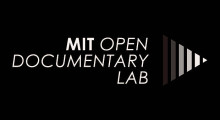
“Do filmmakers need to learn to code?” The inspiration for this blog series came from this question. Software is part of our everyday life; in some circles coding is seen as the new literacy and a means of empowerment. At MIT’s Comparative Media Studies, where the MIT Open Documentary Lab is housed, we are confronted with this question on a regular basis as humanists sitting in a land of hackers who marvel at the power and elegance of code. Fluent in many programming languages, some of them believe that we all should be. In an effort to make coding more […]
by Sarah Wolozin on Mar 7, 2013 -
Immersive Storytelling for The Lost Children Pt. 4
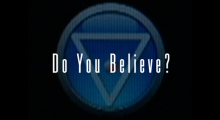
Film as Software The final installment of this series is about the actual screening of The Lost Children feature film at Film Society of Lincoln Center. In working out this screening, I am working with a concept called “Film as Software.” What exactly does this mean? To me it means film taking on some of the qualities of software. One of those qualities is the ability to react to user input in real time. That’s my take. But I asked Mike and Hal of Murmur to join in on the discussion. Murmur is the hybrid studio/technology company handling the interactive […]
by Mark Harris on Jan 28, 2013 -
Immersive Storytelling for The Lost Children Pt. 3

For as long as I can remember, I’ve been a lover of science. Astronomy especially. I grew up watching Carl Sagan’s Cosmos, and James Burke’s great series Connections. Even today, I am indebted to writers like Neil deGrasse Tyson, Stephen Hawking and Sean Carroll for writing about subjects like black holes and the nature of time in ways that a layman like me can understand. I think people like this are imperative to society because many of the subjects they study are critical to us as a race. Two of those subjects are NEOs (Near Earth Objects) and astrobiology. NEOs […]
by Mark Harris on Jan 22, 2013 -
Immersive Storytelling for The Lost Children Pt. 2
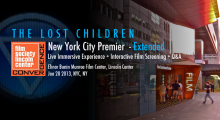
Part 1 of this series laid out the overall plan for The Lost Children Premier event at Film Society of Lincoln Center in January 2013. In this post, I’m going to focus on some thinking behind the live immersive portion of the event. As I’ve been working on this, I’ve been thinking a lot about this term “immersive.” Any great piece of art can be immersive. Any time you get sucked into an amazing movie to the point that you forget you’re actually watching a movie, that is immersive. I remember having that experience with No Country for Old Men. But here, I’m […]
by Mark Harris on Jan 2, 2013
